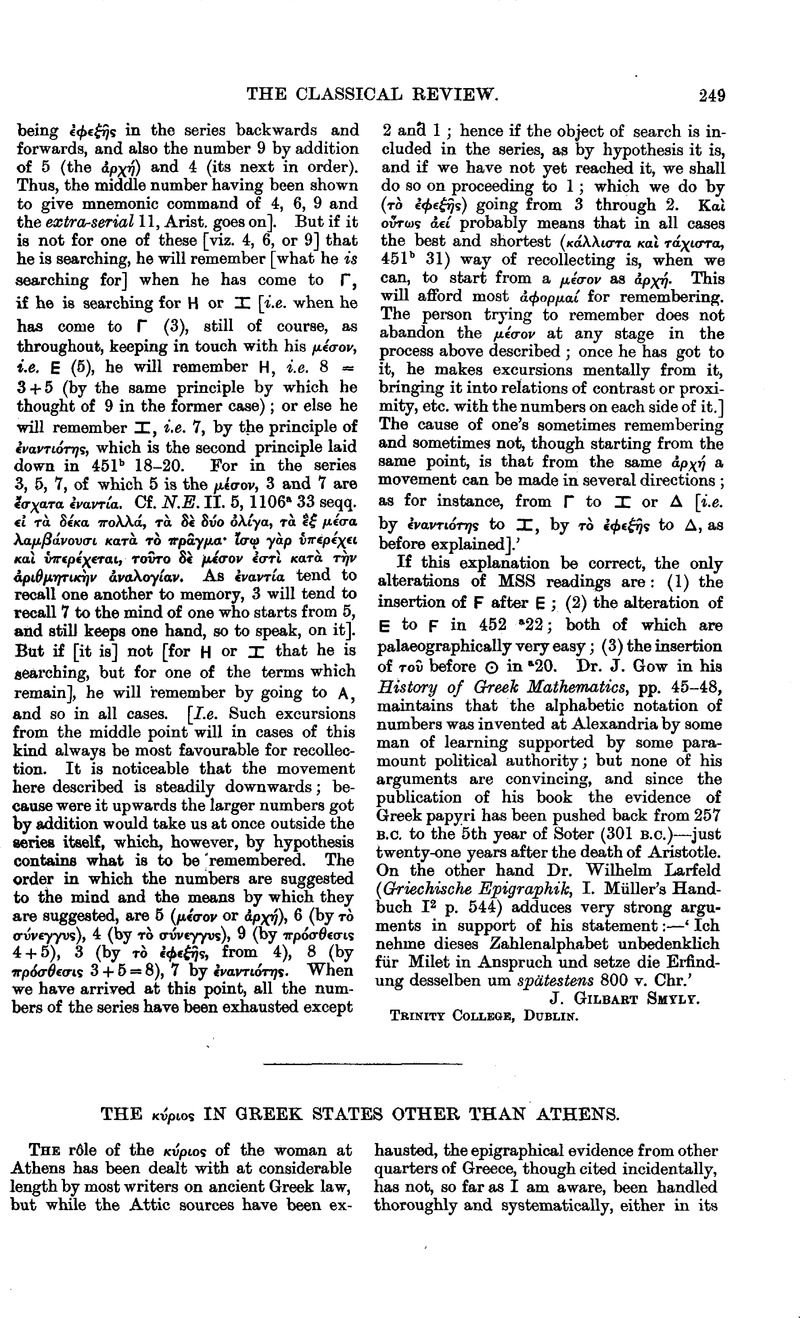No CrossRef data available.
Article contents
The κύριος in Greek States other than Athens
Published online by Cambridge University Press: 27 October 2009
Abstract

- Type
- Original Contributions
- Information
- Copyright
- Copyright © The Classical Association 1906
References
page 250 note 1 In some cases indeed the κριος appears to have been appointed ad hoc.
Cf. Cic. Pro Flacco 30, Tutor his rebus Graecorum legibus adscribendus fuit: Polemonatem scripsisti. Pap. Fayûm xciv. ![]() . Pap. Oxyrh. first series, Ivi. 16, and probably also ibid, cclxxiii. 4.
. Pap. Oxyrh. first series, Ivi. 16, and probably also ibid, cclxxiii. 4.
In these latter cases at any rate the necessity for the appointment of a κριος is probably due, as Mitteis (Reichsrecht u. Volksrecht d. östl. Prov. d. röm. Kaiserreichs, p. 54) suggests, to the comparatively recent introduction of the institution into Egypt.
page 250 note 2 Hdt. ii. 130.
page 250 note 3 Inscr. jurid. gr. i. p. 48 sqq. (of the Macedonian epoch).
page 250 note 4 Ibid. i. p. 378, col. viii. 21.
page 250 note 5 The phrase ![]() , would seem to imply that the ordinary law of Sicyon differed from that of Athens.
, would seem to imply that the ordinary law of Sicyon differed from that of Athens.
page 250 note 6 Inscr. jurid. gr. lére série, No. vii. (third cent. B.C.) passim.
page 250 note 7 S.I.G. 828. 8; ibid. 829. 2, 831. 3.
page 250 note 8 B.C.H. xxvii. (1903), p. 65Google Scholar. Comptes des hiéropes de I'arch. de Sosisihénés, 250 av. J.-C. Cf. ibid. p. 83.
page 250 note 9 Le Bas 323 (cf. Inscr. jurid. gr. i. 258).
page 250 note 10 Le Bas 415.
page 250 note 11 C.I.G.S. i. 3172.
page 250 note 12 S.I.G. 600.
page 250 note 14 C.I.G.Ins. iii. 330.
page 250 note 15 ibid. i. 764, II. 98 and 118.
page 251 note 1 Ath. Mitth. xviii. 415 (third cent. A.D.): cf. D.H.R. ii. p. 249.
page 251 note 2 Inscr. jurid. gr. ii. p. 295 (second cent. A.D.).
page 251 note 3 Le Bas-Foucart, 352 k (second cent. A.D.).
page 251 note 4 C.I.G.S. iii. 318 and iii. 1066 (first cent. B.C. at earliest).
page 251 note 5 C.I.G. add. p. 1005, 2114 bb (first cent. B.C.).
page 251 note 6 Inscr. jurid. gr. ii. p. 315 (second cent. B.C.).
page 251 note 7 Inscr. jurid. gr. ii. p. 315.
page 251 note 8 C.I.G.S. i. 3315, 3321, 3328, 3358.
page 251 note 9 ibid. 2228.
page 251 note 10 ibid. 2872.
page 251 note 11 Michel 1347.
page 251 note 12 Le Bas-Foucart 352, i. (43 B.C.).
page 251 note 13 S.I.G. 437.
page 251 note 14 Inscr. jurid. gr. i. p. 352.
page 252 note 1 Ar. Polit. 1270a 24, Plut. Agis 7.
page 252 note 2 Cf. Gaius, i. 193 (quoted by editors of Inscr. jurid. gr. ii. 106 in note) Apud peregrinos non similiter ut apud nos in tutela sunt feminae: sed tamen plerumque quasi in tutela sunt: ut ecce lex Bithynorum, si quid mulier contrahat, maritum auctorem esse jubet aut filium ejus puberem.
page 252 note 3 I.G. Ins. iii. 330, II. 2 and 110.
page 252 note 4 Inscr. jurid. gr. i. No. vii.
page 252 note 5 Pap. Fayûm 99. 3.
page 252 note 6 ibid. 100. 1.
page 252 note 7 Pap. Ox. i. 45.
page 252 note 8 ibid. i. 48.
page 252 note 9 ibid. ii. 261.
page 252 note 10 ibid. ii. 270.
page 252 note 11 ibid. iii. 504, 1. 6.
page 252 note 12 S.I.G. 828. 8.
page 252 note 13 ibid. 831. 3.
page 252 note 14 De civili conditione mulierum Graecarum, p. 38.
page 252 note 15 Inscr. jurid. gr. i. 367, col. iv. II. 31 sqq.
page 252 note 16 ibid. No. vii. passim.
page 252 note 17 I.G.Ins. iii. 330.
page 252 note 18 op. cit. p. 327.
page 253 note 1 A further indication of the same tendency is the large number of records of θυγατροποΐα found in the eastern parts of the Greek world. E.g. Le Bas-Waddington, iii. 507; ibid. iii. 115. Cf. Rayet in Annuaire, 1875, ix. No. 10.


